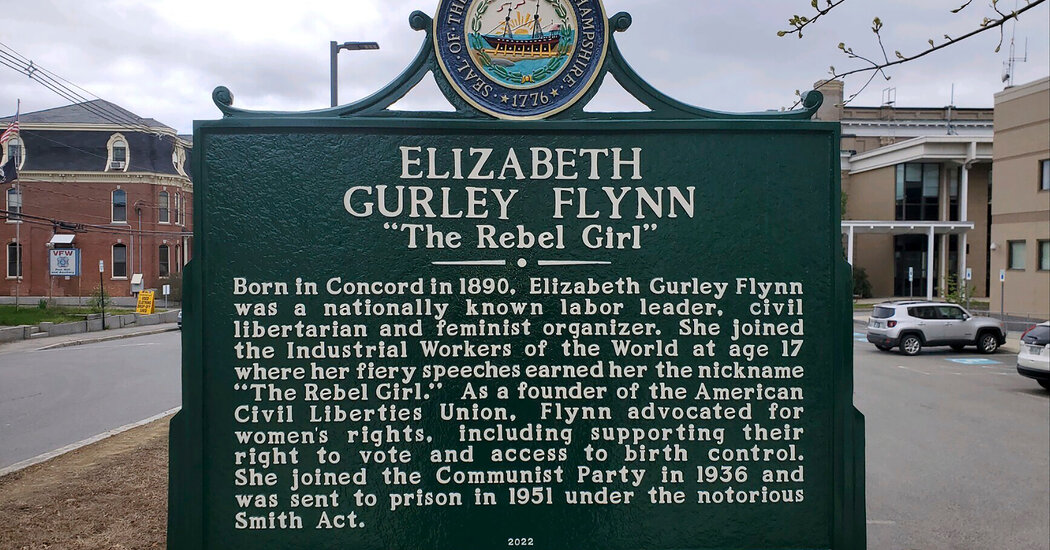From a young age, the activist Elizabeth Gurley Flynn was known to embrace an agenda that espoused workers’ and women’s rights. Ms. Flynn gave her first political speech in 1906, when she was 15, and went on to become a founder of the American Civil Liberties Union, an organizer at the International Workers of the World union and, eventually, a leader of the Communist Party of the United States. Her bold actions earned her the nickname “Rebel Girl.”
Nearly 60 years after her death, her reputation continues to follow her.
Just two weeks after a roadside marker honoring her was installed by the state in her birthplace of Concord, N.H., the state removed the placard after Republican lawmakers raised staunch objections over Ms. Flynn’s communist ties.
As an organizer with the Industrial Workers of the World, Ms. Flynn participated in 1906 in strikes across the country, including the textile mills’ strike in Lawrence, Mass. Ms. Flynn also advocated that women receive the right to vote and helped found the American Civil Liberties Union in 1920 as Americans were interrogated for their communist beliefs.
Joe Hill, the labor organizer, wrote a song which was said to be inspired by Ms. Flynn, which he called “The Rebel Girl.”
In 1953, Ms. Flynn was convicted under the Smith Act of conspiring to teach and advocate the forcible overthrow of the United States government. She was sentenced to three years in prison. Ms. Flynn received a state funeral in Moscow when she died in 1964, and her obituary, describing her as the head of the American Communist Party, appeared on the front page of The New York Times.
“Elizabeth Gurley Flynn’s role in history is well established. Her significance as a historical figure is not in doubt,” Arnie Alpert, a community activist in New Hampshire who led the initiative for Ms. Flynn’s marker, said in an interview. “But what is not well known is that she was born in Concord.”
Mr. Alpert and his friend Mary Lee Sargent first petitioned the state Division of Historical Resources for a historical marker in 2021. The state ordered the plaque in March 2022, and it was approved by Concord’s City Council in December.
The marker was installed on the corner believed to have once been the site of Ms. Flynn’s childhood home, and a groundbreaking ceremony was held on May 1. Two days later, members of New Hampshire’s executive council, a state body of four Republicans and one Democrat, debated the issue of the monument. Joseph Kenney, a Republican council member, described it as “a slap in the face to the state of New Hampshire and the city of Concord.”
On May 15, it was removed.
Mr. Kenney said in an interview that he hoped removing the plaque would teach children a valuable lesson about the history of communism in the United States, and the time when it threatened “to take the world over and change our way of life.”
“My argument starts and rests there,” Mr. Kenney said, adding that he took the installation personally as a former Marine. “We can’t be recognizing someone like that in the state’s capital.”
The swift removal has pitted community organizers against state officials over the intricacies of bureaucratic policies and procedures in the “Live Free or Die” state. In a statement, a spokesman for Gov. Chris Sununu, a Republican, said the governor’s office learned that the marker was located on state property and not city property and “therefore, the marker was removed.”
“All policies and guidelines were followed in removing this controversial marker,” Benjamin Vihstadt, the spokesman, said. “Through their public statements, the City of Concord made clear they were not advocating to keep the marker up.”
Mr. Vihstadt did not elaborate on what that process to have it removed entailed or who ultimately gave the order to have the marker taken down. In a May 10 letter to the state, the city said it “takes no position” on the removal.
Mr. Alpert said proponents of the marker believed the state had “no grounds” to remove it, citing a state policy that requires proposals for revisions or the retirement of markers to be vetted by the state historical resources commission and for their sponsors to be notified.
For now, Mr. Alpert said the advocates’ legal recourse was “unclear.”
Denise Lynn, who studies women in the Communist Party and is the director of gender studies at the University of Southern Indiana, said Ms. Flynn’s role in American labor history deserves recognition.
“It comes down to the kind of history people are willing to acknowledge — the good, the bad, the messy,” Ms. Flynn said. “As a historian we need to acknowledge it all. We’re not engaging with history if we’re not engaging with all parts, even if it make us uncomfortable.”
A spokesman for the state’s Department of Transportation said the marker was currently in a storage facility.

